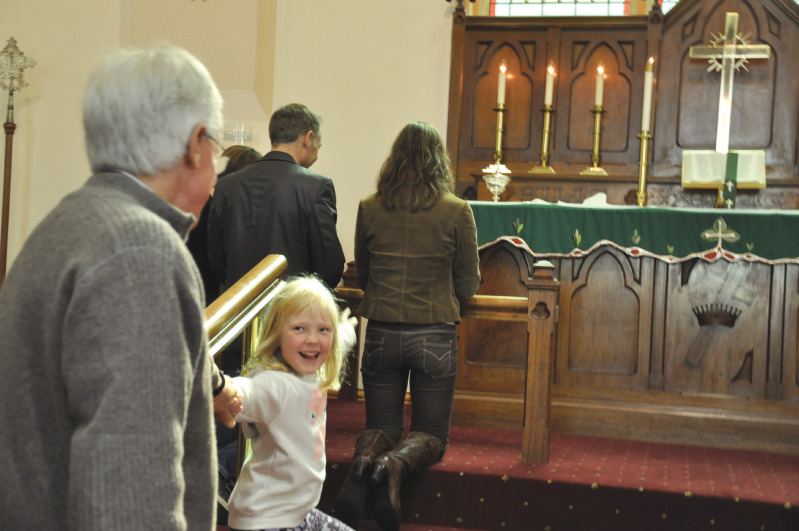 At Grow Ministries, we are often encouraging congregations to rethink their ministry to children, young people and their families. What are we rethinking?
At Grow Ministries, we are often encouraging congregations to rethink their ministry to children, young people and their families. What are we rethinking?
We will frequently begin a training day with a question. Who or what has influenced your life of faith? Think about this for a moment. How would you answer? We often get responses like; parents, grandparents, pastor, Sunday school teacher, mentor, friend, Bible study, Christian camp. What this list says to us is that no matter what decade, geographical location, or size of congregation, relationships with people are one of the most important influences on our faith. The deeper the connection the deeper the impact. Often we put a lot of energy into programs for children and young people that provide a great opportunity for learning and fun, but exclude them from getting-to-know people of the wider congregation. Therefore, our rethinking needs to put effort and emphasis on relationships first, programs second.
So, how can we build relationships with children and young people in our congregations that help to build connections and a sense of belonging?
Since my youth, God, you have taught me, and to this day I declare your marvellous deeds. Even when I am old and grey, do not forsake me, my God, till I declare your power to the next generation, your mighty acts to all who are to come. Psalm 71:17,18 (NIV)
When Grow Ministries began seven years ago, we developed Ten Guiding Principles to help guide our efforts in creating effective practices that support our ministry to children, young people, and their families. We refer to this as intergenerational ministry, as it requires the efforts of all generations and brings benefits to all generations.
- Leadership
When introducing any new way of thinking about doing ministry, we need the support and understanding of the leaders of our homes and congregations. This means sharing the vision with your pastor, church council members and parents.  Intergenerational
Intergenerational
This means finding ways for the different generations to come together for intentional interaction. The sharing of stories of faith and life experiences is beneficial for all generations. This creates a shared understanding of the social, cultural and ministry needs of the different generations and helps to build a sense of belonging to the community. This could take place in a small group setting, through service activities, or a mentoring program.- Faith at Home
While relationships with members of the congregation are important, parents and grandparents are one of the most important influences in a child’s faith. Practising faith at home, by developing faith rituals and creating a space for caring conversations (sharing how God has been working in our lives each day), is important in helping to give children, and young people, a faith language and a confidence to live each day as children of God in the world. - Mentoring
Is an opportunity to walk alongside a younger person, perhaps with similar interests as you, where you can share wisdom and faith either in an informal way or as part of a formal mentoring program. - Lifelong Faith Formation
Realising that we are all on a life-long journey of faith formation, helps us to realise that we do not need to teach children and young people everything about the Christian life before they finish high school. Rather help them build a network of relationships that will continue beyond graduation as well as providing a range of opportunities to learn alongside others, including adults. - Peer Relationships.
While encouraging intergenerational relationships is key in developing lifelong faith formation and building belonging, equally important is providing a space for children and young people to learn and dialogue with their peers. However, it is important to provide mentoring and adult support to these ministries. Opportunities for adults to serve in these ministries could be as small group leaders, welcomers or by providing hospitality. - Personal Crisis
People of all ages will go through tough periods from time to time. This is also true for children and young people. They will experience times of grief and loss, or perhaps a time of high stress or anxiety. During these times, it is important for them to know their church family cares for them and is willing to provide support for them and their family. Think of ways your congregation could offer support to young people, it might be as simple as sending a card to offer encouragement and prayer. - Gifts and Talents
Providing opportunities to serve within our communities is one of the most profound ways to build community and belonging, and this is true for children, young people and adults alike. Invite young people to be involved, alongside experienced volunteers, with appropriate tasks. Tasks such as helping with hospitality, serving communion, welcoming or involvement in your music ministry. - Acts of Service
Providing opportunities within congregational life is important, but inviting families to be involved in serving in their local community alongside their church family can be life-changing. This is not always easy to accommodate due to school and family commitments, thinking creatively and in consultation with families will be the key to success. For example, your congregation could be involved in your local community’s weekend market, or your whole church could be involved in Clean Up Australia Day. - Missional
In everything, we do we need to always be thinking how we are equipping each other for the work of God’s mission in our community. Equipping young people for this task and taking them on the journey with us is important too.
 Do not be overwhelmed by this list or feel like you need to do everything. Rather look at it as a list of colours that will be woven together in an intergenerational tapestry. Or perhaps it is a menu. A menu of opportunities. Think about how God has gifted you and how you could serve a young person in your congregation, family or community. A great place to start is simply getting to know one person a little better. Offer to help at youth events, invite a young person to visit your small group. Ask them to speak about how God is working in their lives. Be prepared to share with them also. Become a prayer partner or a pen pal with a young person. May God bless us as we continue to be faithful servants of God’s mission in this world. In the words of Jesus in Matthew 28:19,20 (NIV): Go and make disciples of all nations, baptising them in the name of the Father and of the Son and of the Holy Spirit, and teaching them to obey everything I have commanded you. And surely I am with you always, to the very end of the age.
Do not be overwhelmed by this list or feel like you need to do everything. Rather look at it as a list of colours that will be woven together in an intergenerational tapestry. Or perhaps it is a menu. A menu of opportunities. Think about how God has gifted you and how you could serve a young person in your congregation, family or community. A great place to start is simply getting to know one person a little better. Offer to help at youth events, invite a young person to visit your small group. Ask them to speak about how God is working in their lives. Be prepared to share with them also. Become a prayer partner or a pen pal with a young person. May God bless us as we continue to be faithful servants of God’s mission in this world. In the words of Jesus in Matthew 28:19,20 (NIV): Go and make disciples of all nations, baptising them in the name of the Father and of the Son and of the Holy Spirit, and teaching them to obey everything I have commanded you. And surely I am with you always, to the very end of the age.

